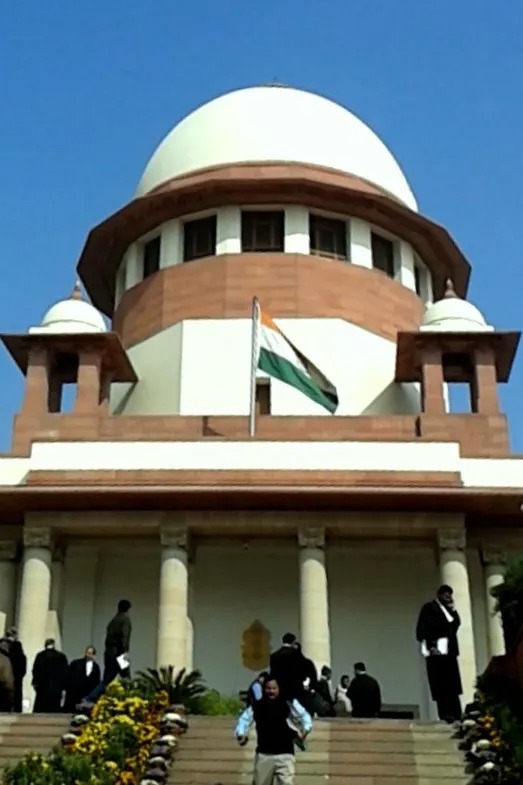Bhagabati Prasad Banerjee, J.@mdashThis is an application for stay of operation of order passed by the learned trial Judge dated July 16, 1993. By the said order the learned trial Judge considering the facts and circumstances of the case and the conduct of the Appellants writ-Petitioners vacated the interim order of injunction granted on October 11, 1991. The writ application is still pending.
2. In this case against an order of demolition u/s 401 of the Calcutta Municipal Corporation Act the Appellants filed a writ application before the learned trial Judge for setting aside and/or quashing the said order u/s 401 of the said Act on the ground that the Appellants writ-Petitioners had made construction at premises No. 3, Pretoria Street, Calcutta, strictly in accordance with the plan sanctioned by the Calcutta Municipal Corporation and, as the said construction was made strictly in accordance with the sanctioned plan, the said notice of demolition on the face of which is mala fide, wrongful and illegal. On the strength of the sanctioned plan certain unauthorised constructions were made which were not disclosed in the writ petition. The learned trial Judge by the order dated April 26, 1993, considered the report of the Special Officer appointed earlier. After hearing the learned Advocates for both the parties gave a liberty to the Appellants to make a representation in accordance with law before the Municipal Commissioner for regularisation of the illegal structures. Such representation was filed by the Appellants before the Municipal Commissioner for the purpose of regularisation of the same. On the basis of the said representation the Municipal Commissioner fixed May 15, 1993, as a date for hearing of the said representation regarding unauthorised constructions made at 3, Pretoria Street, Calcutta. On that date the Appellants'' Advocate-on-Record asked for adjournment on the ground of inconvenience of the learned Advocate appearing for the Appellant. On the basis of the said application for adjournment the matter was adjourned to May 29, 1993. On that date none appeared on behalf of the Appellants and instead one letter was received by the Municipal Commissioner, Calcutta Municipal Corporation by which a prayer was made for further time. The Municipal Commissioner considered the said prayer for adjournment but could not grant any adjournment as the next date of hearing by the learned trial Judge was fixed on June 3, 1993, and on that date he had to submit a report. Accordingly, it is stated that the Municipal Commissioner had no option to consider the letter. The Municipal Commissioner considered the representation and it was found that the following irregularities were there:
(1). Internal court-yard of area 21-15 6 12.35 Mts. per floor has been covered up in 1st to 4th floor level covering 1306 M of extra floor space.
(2). Basement has been extended towards the last covering are of 50 6 26.225 Mts. = 131.125 M2.
(3). Two Nos. of stair-case and lift machine room has been extended in the sixth storey in addition to fifty storey.
3. The Municipal Commissioner also found that the said irregularities were gross in nature and there was no scope for regularization of the same within the purview of the existing law. It is not in dispute that the excess floor area beyond the sanctioned plan was constructed to the extent of 1306.01 sq.m. and on analysis it was found that the permissible FAR was 2.24. But because of the unauthorised construction the FAR was increased to 3.03. The Municipal Commissioner also found that there was no commission or scope to regularise those unauthorised constructions under the purview of the Building Rules. Accordingly, after considering the facts and circumstances of to case and giving reasons stated above the Municipal Commissioner rejected the said representation by the order dated June 3, 1993.
4. In the instant case, after moving the writ application the interim order was obtained, but because of the fact that the Appellant upon representation did not appear before the Municipal Commissioner even though twice the date of hearing was fixed and, under such circumstances, the learned trial Judge considering the facts and circumstances of the case, particularly the conduct of the Appellants, vacated all interim orders. Against the interim orders an appeal was preferred and in connection with the appeal an application was filed.
5. Mr. Anindya Mitra, learned Counsel appearing for the Appellants, submitted that the the Municipal Commissioner should have granted further adjournment for the purpose of enabling the Advocates for the Appellants to appear before the Municipal Commissioner. It was further submitted that in the facts and circumstances of the case the Appellants'' representation was not considered and disposed of in accordance with law.
6. Next it was submitted by Mr. A. Mitra that the Appellants were going to submit certain proposals to the Municipal Commissioner which were not there in the original representation and, unless further opportunity was given to the Appellants, the Appellants would not be in a position to convince the Municipal Authorities and to save the construction. It was suggested by Mr. Mitra that the Appellants were contemplating to demolish some other portions for the purpose of bringing the affairs within the permissible limit. For that reason the Municipal Authorities should be directed to reconsider the matter and they should not be proceeded with the demolition of the construction which was found to be unauthorised.
7. Mr. Mitra relying upon the decision of the Supreme Court in the case of
8. Reliance was also placed by Mr. Mitra to the Full Bench of this Court in the case of
9. Mr. Pratap Chatterjee, learned Counsel appearing for the Calcutta Municipal Corporation, submitted that even though there was no provision for relaxation of such Rules and even though the deviation was of a very high magnitude the learned trial Judge directed a representation be made. But on two different dates none appeared for the Appellant before the Municipal Commissioner en the basis of such representation. But the Municipal Commissioner had considered such representation on its merit and found that it was not possible to relax such irregularities. It was submitted by Mr. Pratap Chatterjee that when such unauthorised construction was made deviating from the sanctioned plan it was not possible for the Appellant to get any further relief from this Court.
10. We have considered the facts of this case and also the submissions of the learned Counsel appearing for the parties. After considering the same we are of the view that the principles laid down by the Supreme Court in the case of Rajatha Enterprises (Supra) have no application in the facts and circumstances of the case inasmuch as under that Act there was permissible limit compounding being 5 % and the excess FAR would found to be negligible and consider the fact that there was no evidence whatsoever of dishonesty or fraud or negligence on the part of the builder. The Supreme Court condoned the deviation and restrained the principal authorities from demolishing the said construction. In the instant case, 1306 Sq.ms. unauthorised constructions have been made deviating the sanctioned plan and the learned trial Judge gave an opportunity to the Appellant for the purpose of making representation and convincing the authorities concerned if the authorities concerned would regularise and condone the same. It appears to us that the learned trial Judge had directed a representation be made and even though an application was made with regard to the representation by the lawyer. Still then the Municipal Commissioner adjourned the matter once with regard to the difficulty on the part of the learned Advocate for the Appellant to appear before the Municipal Commissioner. On the next date the Municipal Commissioner could not adjourn because of the fact the Municipal Commissioner was to submit the report immediately and that was why he had the option to reject the application for further adjournment. The learned trial Judge had passed an order in favour of the parties. The parties failed and neglected to take advantage of that order. In the event the parties were not entitled to any indulgence which was the precise view taken by the learned trial Judge and because of that advantage the learned trial Judge and because of that advantage the learned trial Judge had vacated the interim order of injunction. Admittedly, there was unauthorised construction and there was a serious deviation. Such a deviation was not disclosed in the writ petition. This is also a factor which must be taken into consideration by this Court while considering the prayer for granting any interim order. Even though at this stage we are not making any final adjudication of the subject-matter in dispute, still then it may be placed on record that it is one of the established principles that one bona fide to a writ Court which is an equitable remedy must come with clean hand and further there should not be any suppression of material facts. It appears to us even though the construction was made in gross deviation of the sanctioned plan and the irregularities were very serious in nature in the writ petition and nothing was said. An impression was sought to be created before the Court when a party had made a construction strictly on the basis of the sanctioned plan the Municipal Authorities had acted mala fide without jurisdiction and without the authority of law in passing an order.
11. Considering the magnitude of the deviation and considering the provisions of the Calcutta Municipal Act and/or Building Rules and the conduct of the parties which was duly taken into consideration by the learned trial Judge, we do not find any reason to interfere with the order passed by the learned trial Judge. Accordingly, we do not find any reason to stay the order passed by the learned trial Judge. Accordingly, the application for stay of the operation of the order passed by the learned trial Judge is rejected.
12. Since the writ application is pending we make it clear that we have not adjudicated any of the points on merits.
13. The view we have already taken, no useful purpose will be served in keeping the appeal pending. The appeal is treated as on day''s list and is disposed of along with the application on the above terms. All undertakings are dispensed with.
14. Mr. Mitra, the learned Counsel appearing for the Appellants, prays for stay of demolition of the premises in question for five days.
15. Considering the facts and circumstances of the case, the prayer is considered and rejected.
16. All parties to act on a signed xeroxed copy of this judgment on the usual undertaking.
Asok Kumar Chakravarty, J.: I agree.

